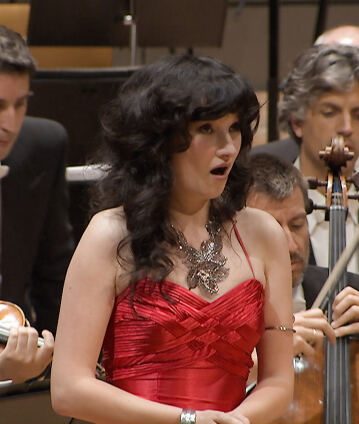Claudio Abbado, Maurizio Pollini and Anna Prohaska

Claudio Abbado and Maurizio Pollini: one of the great artistic friendships of classical music. In this concert, they perform Mozart’s Piano Concerto No. 17. A second Mozart soloist is the soprano Anna Prohaska, who is also heard in Alban Berg’s Symphonic Pieces from Lulu. The concert closes with the Adagio from Mahler’s Tenth Symphony: a manifestation of the hopelessness and a farewell to life.
Wolfgang Amadeus Mozart’s Piano Concerto in G major is captivating, not least because of the prominent role of the wind instruments. On an almost equal footing, they converse with the piano, awaking memories of ensemble scenes in Mozart’s operas. And just as in an opera, the gamut of emotions is run: “Within its friendly key”, the work is “full of secret smiles and secret sorrows,” fittingly wrote the Mozart scholar Alfred Einstein. There is genuine theatrical drama in this concert with Mozart’s concert aria K 418, giving us the opportunity to meet Anna Prohaska, a young soprano from the Staatsoper Unter den Linden and a rising star of the Berlin music scene.
The concert opens with Alban Berg’s Symphonic Pieces from Lulu, which Berg put together to promote his opera, at a time when he saw the planned premiere threatened by the Nazi regime. The result is a fully-grown five-movement symphony resembling not least the symphonies of Mahler – a composer who Berg deeply admired and whose baton he once stole as a souvenir. Notably, the parallels between the last of the pieces, an adagio, and the Adagio from Mahler’s Tenth are clear; both manifestations of the hopelessness of, and a farewell to life.
© 2011 Berlin Phil Media GmbH
Related interviews
Artists
Our recommendations
- Chopin’s Piano Concerto No. 1 with Maurizio Pollini and Christian Thielemann
- Claudio Abbado conducts Beethoven and Mendelssohn
- Daniel Harding conducts Schumann’s “Scenes from Goethe’s Faust”
- François-Xavier Roth and Isabelle Faust
- “Late Night” concert with Simon Rattle
- The 12 Cellists and Anna Prohaska